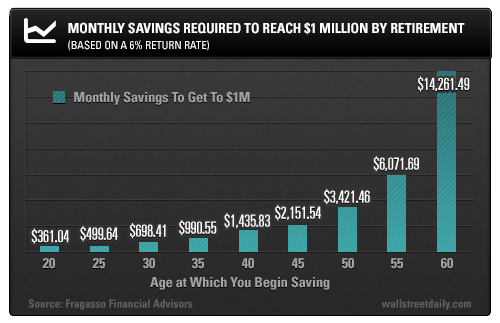Baby Boomers and retirement – it’s a tough subject for anyone in the financial planning business.
After working most of their lives, Baby Boomers want it all in retirement: travel, dining out, owning two cars and multiple homes. And they want to do this off of income generated by their investments.
Yet you’d be amazed how many people go to see an advisor with far too little in savings or investments to enjoy that sort of retirement. Even those people who have enough assets often have them allocated extremely poorly.
The hard truth is that, by your mid 50s or early 60s, you should have at least seven to eight times your annual salary tucked away if you want to maintain your current lifestyle in retirement.
I no longer give professional investment advice, but here are some of my thoughts on Baby Boomers and retirement.
Playing Catch-Up
Sadly, many Baby Boomers have spent everything forward. A recent survey from The Insured Retirement Institute found that six in 10 respondents said they had no retirement savings. They seem to have spent more time planning family vacations than their own golden years.
If that sounds familiar, it’s time to play catch-up. The chart below shows how much you’d have to save, starting at various ages, to retire with $1 million:

Fortunately, if you’re over 50, Uncle Sam does try to help a bit. If you have a 401(k) plan, save the maximum amount allowed by the IRS. For 2015, that limit is $18,000, with another $6,000 permitted in catch-up contributions. For traditional and Roth IRAs, the limit this year is $5,500, with another $1,000 allowed for those over 50.
Still, for many people, that won’t be enough to retire at 62, and they’ll have to keep working for several more years.
Many Boomers understand this. The survey from The Insured Retirement Institute found that 36% of respondents say they’ll retire at age 70 or older. That gives them additional time to accumulate wealth for retirement. And it will, of course, result in a higher monthly Social Security payment upon retiring.
Retirement Investing and Asset Allocation
Properly allocating your assets is key for Baby Boomers. After all, you’re not really trying to get rich. You’re just trying to keep what you’ve accumulated over the years.
In the past, the simple rule for the stock portion of your portfolio was 100 minus your age. Then, it changed to 120 minus your age. The remainder was allocated to fixed income investments and possibly other assets, such as real estate and gold.
With today’s bull market mentality, though, you might think the proper stock allocation is 100% in stocks even 10 years after your death!
But here’s the thing: Properly allocating to stocks is trickier than using a simple formula.
I believe that stock allocation in a portfolio should be at its lowest point during the year or two before retirement and the year or two afterwards. That’s when you’re most vulnerable to losing wealth at just the wrong time. Work with your advisor for specific percentages – particularly because bonds have also become a relatively high-risk investment.
With regard to my point about vulnerability, just look at recent history. Between October 2007 and March 2009, the S&P 500 Index lost 55% of its value. According to the Employee Benefit Research Institute, nearly one in four people aged 56 to 65 had at least 90% of their portfolio in stocks, and more than two in five had at least 70% in stocks – not good if you’d planned your retirement in that time frame.
Likewise, don’t get fooled into thinking that target date funds, set up specifically for retirement, will protect you. In 2008, the average 2010 target fund lost almost 25%. As I keep saying in these articles, a cookie cutter, autopilot approach will not work.
Finally, as counter-intuitive as it sounds, I believe the stock portion of a portfolio should begin to rise once a person is a few years into retirement. Lifespans are increasing – people are living 25 to 30 years in retirement – and that means you’ll need the growth that stocks offer over the long term. And don’t get me started on those pesky rising healthcare costs.
Bottom line: You can’t have your retirement assets just idling at zero interest rates, as you run the risk of outliving your nest egg.
Good investing,
